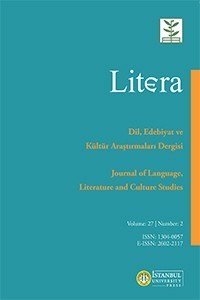Female Travel in the German Empire: Women’s Emancipation and Advocacy of Colonialism in Frieda von Bülow’s In the Land of Promise
Female Travel in the German Empire: Women’s Emancipation and Advocacy of Colonialism in Frieda von Bülow’s In the Land of Promise
In German historiography, women’s participation in colonial conquests has long been ignored. In fact, as early as the 1880s, the German female bourgeoisie began to take an interest in the colonies. It was common for bourgeois women to gather within a feminist circle and to accompany the men on colonial expeditions, thus putting the patriarchal origin of the German Empire into question. Our contribution focuses on Frieda von Bülow’s colonial novel In the Land of Promises. Her novel shows that women’s presence in the colonies, which at first might seem to be a form of emancipation coupled with exoticism, in fact led to the legitimization of colonization. As a result, the notions of sex, race, and colony are tightly bound together. Ultimately, the novel shows that women’s participation in the colonial process maintained the purity of the German identity by establishing a racial order in the colonies that allowed the Germans to avoid bicultural relations.
Keywords:
Travel, emancipation, woman, race colony,
___
- Bettina, D. (2013). Eine reise in die emanzipation und zurück: Der koloniale raum als literarischer rahmen zur definition von weiblichkeit in Lydia Höpkers um scholle und leben.Andererseits, Yearbook of Transatlantic German Studies, 3, 69–86.
- Dietrich, A. (2006). Konstruktionen weisser weiblichkeit. Emanzipationsdiskurse im kontext des kolonialismus. Im M. Bechhaus-Gerst & S. G. Lang (Eds.),Koloniale und postkoloniale konstruktionen von Afrika und Menschen Afrikanischer Herkunft in der deutschen Alltagskultur (S. 33–44). Frankfurt, DE: Peter Lang.
- Eigler, F. (1998). Engendering German nationalism: Gender and race in frieda von Bülow’s colonial writings. Im S. Friedrichsmeyer, S. Lennox & S. Zantop (Eds.), The imperialist imagination: German colonialism and its legacy (S. 69–85). Ann Arbor, Michigan: University of Michigan Press.
- El-Tayeb, F. (2001). Schwarze Deutsche: Der Diskurs um ›Rasse‹ und nationale Identität 1890–1933. Frankfurt, DE: Campus Verlag.
- Mamozai, M. (2009). Einheimische und koloniale frauen. Im M. B. Gerst & M. Leutner (Eds.), Frauen im deutschen Kolonien (S. 14–31). Berlin, DE: Ch. Links Verlag.
- Moura, J-M (1999). Littérature coloniale et exotisme : Examen d’une opposition dans la littérature coloniale. In J. Durand (Ed.), Regards sur les littératures coloniales d‘Afrique francophone (S. 22–39). Paris, FR: L. Harmattan.
- Oloukpona-Yınnon, A-P. (2001). Femme, littérature et colonialisme: Le cas du Togo allemand. Im P.S. Diop, H. Lüsebrink, U. Fendler & C. Vatter (Eds.), Littératures et sociétés africaines : Regards comparatistes et perspectives interculturelles (S. 345–357). Tübingen, DE: Gunter Narr Verlag.
- Ridley, H (1983). Images of imperial rule. London, UK: St Martin’s Press.
- Riesz, J. (1989). Références à la révolution Française et aux droits de l’Homme dans la littérature coloniale et la littérature francophone. Französisch Heute, 3, 225–237.
- von Bülow, F. (1899). Im lande der verheissung: Ein Deutscher kolonialroman. Dresden, DE: Verlag von Carl Reißner.
- Walgenbach, K. (2005). Die weiße frau als trägerin Deutscher kultur. Im K. Walgenbach (Ed.), Koloniale diskurse zu geschlecht, rasse und klasse im kaiserreich (pp.119–136). Frankfurt, DE: Campus Verlag.
- Warmbold, J. (1982). Deutsche kolonialliteratur: Aspekte ihrer geschichte, eigenart und wirkung: Dargestellt am beispiel Afrikas. Lübeck, DE: University of Lübeck.
- Wild, I. (2002). Freiburger literaturpsychologische gespräche: Jahrbuch für literatur und psychoanalyse, band 21. Freiburg, DE: Freiburger Arbeitskreis
- Wildenthal, L. (1994). Colonizers and citizens: Bourgeois women and the women question in the German colonial movement, 1886-1914 (Doctoral dissertation University of Michigan, Michigan). Retrieved from https://deepblue.lib.umich.edu/handle/2027.42/39366/browse?value=Wildenthal%2C+Lora+Joyce&type=author
- Wildenthal, L. (1998). When men are weak: The imperial feminism of Frieda von Bülow. Gender and History, 10(1), 53–77.
- Wildenthal, L. (2003). Rasse und Kulter Frauenorganisationen in der deutschen Kolonialbewegung des Kaiserreichs. Im B. Kundrus (Ed.), Phantasiereiche. Zur Kulturgeschichte des deutschen Kolonialismus (pp. 202–219). Frankfurt, DE: Campus Verlag.
- Başlangıç: 1954
- Yayıncı: İstanbul Üniversitesi
Sayıdaki Diğer Makaleler
Poe’nun Ligeia ve Şişede Bulunan Not Öykülerinde Tanpınar’ın Geçmiş Zaman Elbiselerini Aramak
McDonagh’ın Yastık Adam (The Pillowman) Oyununda Anlatı Protezi: Psikopatolojiye Karşı Normallik
Nkouda Sopgui ROMUALD VALENTIN
Tahar Ben Jelloun’un Kutsal Gece Adlı Romanında Bellek ve Kimlik Algısı
